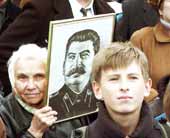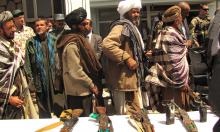Russians split in their estimations of Joseph Stalin's role in history
People accuse Stalin of a whole bouquet of crimes, including genetic modification of the Russian nation
Joseph Stalin is reputed to have become one of the most mythological and demonic personalities in the history of the 20th century. Stalin is the greatest Soviet leader, a genius for some people and a blood-thirsty tyrant for others. There is no honest and whole position about Stalin's role in the world history and in the development of the Russian state. 
A lot of people accuse Stalin of repressions, terror and genocide of his own nation, crimes against foreign citizens and the Church. People blame Stalin for his embarrassment in the summer of 1941, when fascist Germany attacked the USSR, for the improper command of the army and the national defense, which resulted in monstrous human losses in the war, for the exploitation of GULAG prisoners and for many other crimes, including the “genetic modification” of the Russian mindset and spirituality with a view to create a new kind of Soviet people.
One has to give Stalin credit as a state leader: the USSR experienced a powerful economic breakthrough over a short period of time from the historical point of view.
Basic goals and tasks, which were solved within about 30 years of Stalin's stay at power, gave a new incentive to the development of the country, whereas the whole nation still has to face those results. “The personality cult does not allow the Russian common people and the elite to take an honest look at the history of their nation and give Stalin credit for turning the USSR into a superpower of the 20th century,” CMNews.Ru wrote.
The Russian Center for Public Opinion has recently conducted an opinion poll, which was devoted to Russian people's opinion about the role of the notorious Soviet leader.
Fifty percent of respondents said that they positively estimated Stalin's role in the life of the country. About 37 percent of people said that they treated his persona negatively. A similar situation could be observed two years ago, although the share of positive attitude to Stalin increased from 16 to 20 percent, whereas the negative attitude dropped from 35 to 30 percent. It goes without saying that peoples' attitude to Stalin's legacy depends on their age group. Middle-aged Russians were not positive in their estimation of Stalin's role in the USSR, whereas both elderly and young people (18-24 years of age) said that their opinion on the matter was positive.
It is noteworthy that 42 percent of respondents believe that up-to-date Russia needs such a politician as Stalin. Fifty-two percent said that they rejected such a possibility. The need in a Stalin-like politician was presumably expressed by elderly people: 60 percent supported the idea and 32 percent of the same age group denied it. Thirty-one percent of young people would like to see someone like Stalin in Russia; 62 percent of young respondents do not share this point of view, though.
Subscribe to Pravda.Ru Telegram channel, Facebook, RSS!





